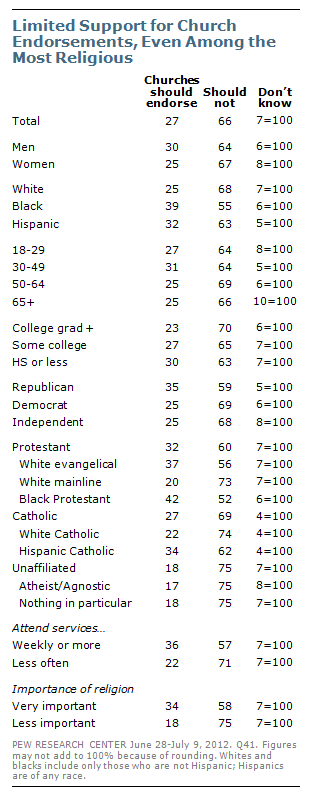 Earlier this week, a group of religious leaders presented a report to Sen. Charles E. Grassley (R-Iowa) in which they recommended an end to the long-standing ban on clergy endorsements of political candidates. The group, known as the Commission on Accountability and Policy for Religious Organizations, is seeking to change a 1954 provision in the Internal Revenue Code that limits the political activities of tax-exempt charitable organizations, including churches and other religious groups.
Earlier this week, a group of religious leaders presented a report to Sen. Charles E. Grassley (R-Iowa) in which they recommended an end to the long-standing ban on clergy endorsements of political candidates. The group, known as the Commission on Accountability and Policy for Religious Organizations, is seeking to change a 1954 provision in the Internal Revenue Code that limits the political activities of tax-exempt charitable organizations, including churches and other religious groups.
The Pew Research Center has never directly asked for opinions on the question of whether churches and other houses of worship should be allowed to support particular candidates while retaining their nonprofit status. But there is data showing that the public remains wary of church involvement in partisan politics. Two-thirds of Americans (66%) say houses of worship should not endorse political candidates, while 27% say houses of worship should endorse candidates, according to a 2012 Pew Research poll. Opinions on this question have remained relatively steady in Pew Research surveys dating back to 2002.
There is broad agreement across many demographic groups that churches should not endorse political candidates. Among religious groups, roughly three-quarters of white mainline Protestants (73%), white Catholics (74%) and the unaffiliated (75%) say that churches should refrain from endorsing particular candidates. Opposition to political endorsements by churches is less pronounced among white evangelical Protestants (56%) and black Protestants (52%).
People who attend religious services regularly and those who say religion is very important in their lives are more inclined than less religious Americans to support houses of worship making political endorsements. But even among these more religious groups, majorities say churches should refrain from endorsing political candidates (57% and 58%, respectively).
A Pew Research poll taken shortly after the 2012 election found that relatively few Americans heard explicit political endorsements at church during the election season. Among voters who attend religious services at least once a month, just 5% said the clergy at their place of worship urged them to vote a particular way, while 93% said they were not urged to vote a certain way.



